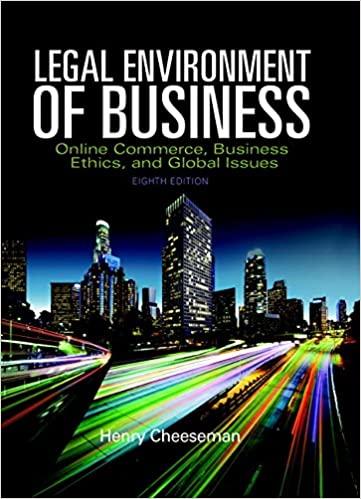Answered step by step
Verified Expert Solution
Question
1 Approved Answer
Discussion: To receive full credit, use 5 terms from the chapter to discuss the following questions! 1) If you started a business, what kind would
Discussion: To receive full credit, use 5 terms from the chapter to discuss the following questions! 1) If you started a business, what kind would it be and what legal structure would you choose and why would you choose that legal structure? 2) Besides getting the start-up money, what do you think would be the most challenging issue? 3) What would be the easiest part of starting up? CHAPTER THREE: BUSINESS ENTITIES AND INSURANCE Let's start at the Beginning If you were going to start a business, you would first have to decide what your primary business would be. Would you want to operate a restaurant, Bed and Breakfast, hotel, bar, theme park, entertainment arena, catering business, event-planning company, theater, travel planning agency Or ??? Next, you would have to consider what type of business form your business should have. There are several different types to choose from, each with advantages and disadvantages. Some of the factors in choosing a business form are: how many owners want to be involved, what depth of involvement does each owner want, desired liability of the owner(s), tax consequences, ease and expense of formation, and need and ability to raise capital. Business Forms Let's look at an overview of the main types of business forms: Sole Proprietorship, Partnership, Limited Liability Company, Corporation, S corporation, and Non-profit Organization. There are also Cooperative Agreements in which people or businesses form cooperatives to meet a collective need or to provide a service that benefits all member-owners. Search www.SBA.gov for more in-depth information on this. An overview chart of the business forms Sole Proprietorship A business owned by a single person or family. This is a good choice for owners, who are not concerned about personal liability and want minimal formalities and maximum flexibility. Useful structure for small business service-type company where there are low risks and minimal assets involved. Various types of insurance policies are generally used to offset liabilities in this type of structure. Examples: Artist, Florists, Writer, Consultant, Marketer, House-cleaning, Landscape enterprises, Home companionship services Partnership An agreement by two or more people to carry on, as co-owners, a business for profit. There are several different types of partnerships. The type depends on the how parties want to arrange the structure, which will affect partner responsibility for the business. Good choice for owners not concerned about personal liability, who want to share ownership with others, but with minimal formalities and maximum flexibility. May be a valid choice in some states to operate a Family Farm where a Sole Proprietorship structure is not allowed. Useful structure for small business service-type company where there are low risks and minimal assets involved. Malpractice insurance and other types of insurance policies are generally used to offset liabilities in this type of structure. Examples: Accounting firm, Law office, Investments firms that invest only money of the Partners Limited Liability Company Legal entity or a business structure allowed by state statute that has a tax ID, and can conduct business under its own name. Owners of an LLC are called members. Most states do not restrict ownership, and so members may include individuals, corporations, other LLCs and foreign entities. There is no maximum number of members. Most states also permit "single-member" LLCs, those having only one owner. An LLC is designed to provide the limited liability features of a corporation and the tax efficiencies and operational flexibility of a partnership. Usually very inexpensive to form. Great choice for owners desiring the liability protection of a corporation, but with minimal corporate formalities, and the simplicity of pass-through taxation of income. Since an individual can be a 'sole' member , it is a preferred form to a sole proprietorship for most small businesses. Corporation A legal entity formed in compliance with the statutory requirements of its state of incorporation, owned by shareholders whose liability is limited to their investment in the corporation, and managed by (i) a board of directors elected by the shareholders and (ii) officers employed by the board of directors. A corporation is more complex and generally suggested for larger, established companies with multiple employees. Good choice for owners wanting maximum tax and ownership flexibility, combined with liability protection. S corporation An S corporation is similar to a C corporation but the entity is taxed only on the shareholders individual level. Good choice for owners desiring the liability protection of a corporation, with the simplicity of pass-through taxation of income. Non-profit Organization Can qualify as public charities and be exempt from federal and state corporate income tax
Step by Step Solution
There are 3 Steps involved in it
Step: 1

Get Instant Access to Expert-Tailored Solutions
See step-by-step solutions with expert insights and AI powered tools for academic success
Step: 2

Step: 3

Ace Your Homework with AI
Get the answers you need in no time with our AI-driven, step-by-step assistance
Get Started


